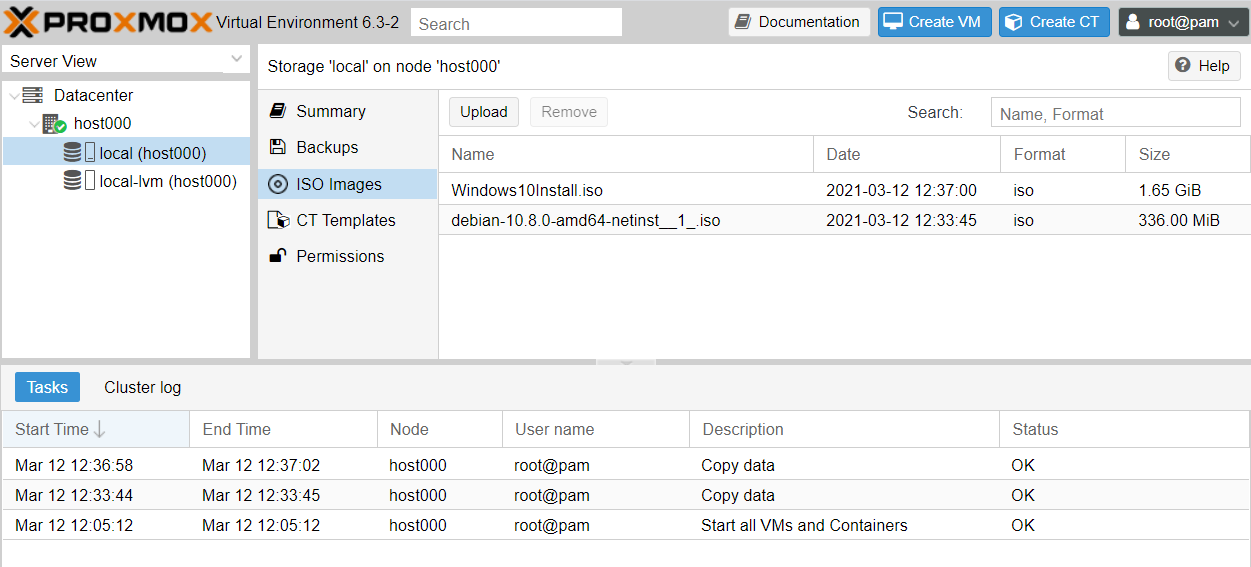Best PC platform for running Esxi/Docker at home?
-
On second thought, I'll try ProxMox on a system I previously built for Esxi that has 9 drives:
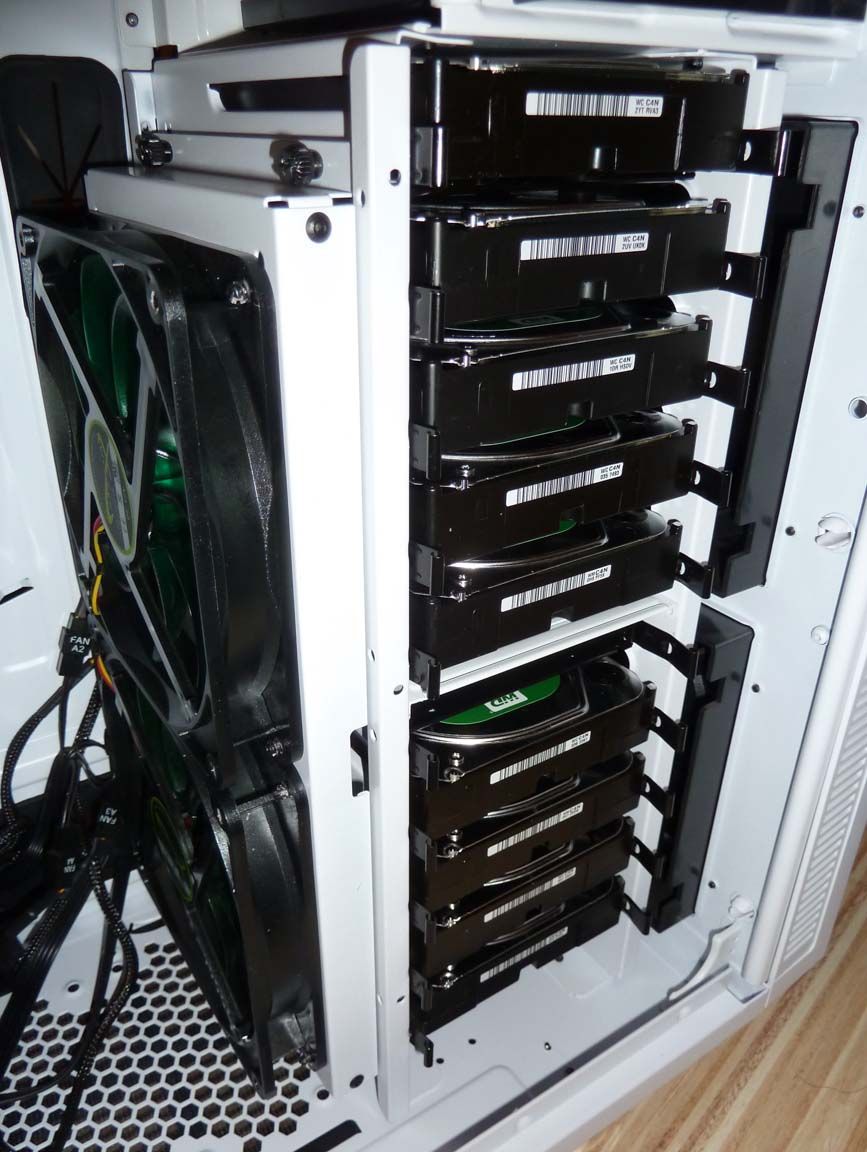
Out with the old hypervisor and in the with the new! This way I'll have plenty of drives to try BTRFS in a Linux VM and whatever else.
-
@mfalkvidd said in Best PC platform for running Esxi/Docker at home?:
@NeverDie looks like a Fractal Design Refine case?
Nope. It's the Nanoxia Deep Silence 6 Super Tower Case. It promised the most soundproofing of nearly any computer case on the market at the time, and the large size makes wiring things up easier than working in cramped quarters. That was six years ago, though, so maybe there's something better available now.
The one case that stood out as being better was one that was completely sealed and which had a lot of heatsink fins milled into the outside of its case. Being sealed, I've got to believe it would have had the best soundproofing by far. It looked beautiful but was hugely expensive.
I imagine these days a bunch of M.2. nvme's would be the way to go--faster, smaller, and less power.
I recently set up a Ryzen 3 3100 as a gaming computer for my son, and it's nearly silent even with just a cheap run-of-the-mill computer case. Come to think of it, maybe later tonight I should test its at-the-wall power draw when it's idle.... :smile:
-
@mfalkvidd said in Best PC platform for running Esxi/Docker at home?:
@NeverDie looks like a Fractal Design Refine case?
Nope. It's the Nanoxia Deep Silence 6 Super Tower Case. It promised the most soundproofing of nearly any computer case on the market at the time, and the large size makes wiring things up easier than working in cramped quarters. That was six years ago, though, so maybe there's something better available now.
The one case that stood out as being better was one that was completely sealed and which had a lot of heatsink fins milled into the outside of its case. Being sealed, I've got to believe it would have had the best soundproofing by far. It looked beautiful but was hugely expensive.
I imagine these days a bunch of M.2. nvme's would be the way to go--faster, smaller, and less power.
I recently set up a Ryzen 3 3100 as a gaming computer for my son, and it's nearly silent even with just a cheap run-of-the-mill computer case. Come to think of it, maybe later tonight I should test its at-the-wall power draw when it's idle.... :smile:
@NeverDie said in Best PC platform for running Esxi/Docker at home?:
Ryzen 3 3100 as a gaming computer
Reporting back: the entire computer draws 60 watts from the wall when idle, whereas it draws 305 watts if running a fractal graphics benchmark. The takeaway is that even 60 watts can still be nearly silent if the fans and power supply are carefully chosen to be quiet. This particular build uses a refurbished Corsair Ax860i for the power supply, and so at 60 watts its fan doesn't even spin. For the case fan it uses a Phantek PH-F120MP_BK_PWM, which is a very quiet fan and which furthermore spins only when the motherboard gets warm. The CPU fan is just the stock AMD Wraith Stealth cooler that came packaged with the CPU, but also with PWM controlled by the motherboard.
-
Building quiet PCs is so addictive. Once you're used to it, every little rattling becomes an annoyance. It didn't took long until I had to get rid of all spinning HDDs in favor of SSDs. And as soon as everything was dead silent... I bought myself a clicky mechanical keyboard, oh well.. :D
Nanoxia Deep Silence and Fractal Design Define are indeed nice sound-insulated cases for quiet builds with plenty of space and features.
For silent cooling, I can recommend be quiet (especially the Silent Wings fans) and Noctua (basically everything). The latter is quite pricy though.
-
It seems that a minimum of 3 disks is required for running ProxMox: one to boot from, one for ISO's, and one for VM's. I'm surprised it's that literal and not able to partition one disk into 3 equivalent disks. It advises not to use a USB flash for the boot disk.
@NeverDie said in Best PC platform for running Esxi/Docker at home?:
It seems that a minimum of 3 disks is required for running ProxMox: one to boot from, one for ISO's, and one for VM's. I'm surprised it's that literal and not able to partition one disk into 3 equivalent disks. It advises not to use a USB flash for the boot disk.
Not true. I have 1 SSD running proxmox. And two more disks passed trough to vm's for storage, but the proxmox part is entirely on the small SSD. It is just partitioned using LVM.
-
@NeverDie said in Best PC platform for running Esxi/Docker at home?:
It seems that a minimum of 3 disks is required for running ProxMox: one to boot from, one for ISO's, and one for VM's. I'm surprised it's that literal and not able to partition one disk into 3 equivalent disks. It advises not to use a USB flash for the boot disk.
Not true. I have 1 SSD running proxmox. And two more disks passed trough to vm's for storage, but the proxmox part is entirely on the small SSD. It is just partitioned using LVM.
@monte said in Best PC platform for running Esxi/Docker at home?:
It is just partitioned using LVM
@monte How did you do it? Did you pre-partition the disk before installing Proxmox, and then Proxmox just found what you did and adopted it, or is it more involved than that?
I started with the ProxMox beginner video, which used 3 disks and gave no hints on how to use fewer:
-
@monte said in Best PC platform for running Esxi/Docker at home?:
It is just partitioned using LVM
@monte How did you do it? Did you pre-partition the disk before installing Proxmox, and then Proxmox just found what you did and adopted it, or is it more involved than that?
I started with the ProxMox beginner video, which used 3 disks and gave no hints on how to use fewer:
@NeverDie to be honest, I don't rememver :) It was so long ago, I was just updating the system from then. But I guess there might be an option in the installer... I will try it in vm, you made me curious :)
UPDATE: I've just ran the install and it plain and simple, no extra options. It automatically partitioned the disk. The only drawback is that you don't have ability to fine tune the sizes of partitions, but that can be done later with some LVM magic :)
-
@NeverDie to be honest, I don't rememver :) It was so long ago, I was just updating the system from then. But I guess there might be an option in the installer... I will try it in vm, you made me curious :)
UPDATE: I've just ran the install and it plain and simple, no extra options. It automatically partitioned the disk. The only drawback is that you don't have ability to fine tune the sizes of partitions, but that can be done later with some LVM magic :)
@monte said in Best PC platform for running Esxi/Docker at home?:
@NeverDie to be honest, I don't rememver :) It was so long ago, I was just updating the system from then. But I guess there might be an option in the installer... I will try it in vm, you made me curious :)
UPDATE: I've just ran the install and it plain and simple, no extra options. It automatically partitioned the disk. The only drawback is that you don't have ability to fine tune the sizes of partitions, but that can be done later with some LVM magic :)
That's what I started with too, but then when I went to upload ISO's or create VM's, ProxMox said there was no disk available for that.
-
So to be precise, Proxmox installer creates LMV VG (volume group) called
pve, in which it creates LV(logic volume)root,swapand andother volume, which in fact is a pool for another thin volumes that will be created for each VM and container, calleddata. So ISO's, backups and other stuff related to proxmox itself will be located atrootvolume. -
@monte said in Best PC platform for running Esxi/Docker at home?:
@NeverDie to be honest, I don't rememver :) It was so long ago, I was just updating the system from then. But I guess there might be an option in the installer... I will try it in vm, you made me curious :)
UPDATE: I've just ran the install and it plain and simple, no extra options. It automatically partitioned the disk. The only drawback is that you don't have ability to fine tune the sizes of partitions, but that can be done later with some LVM magic :)
That's what I started with too, but then when I went to upload ISO's or create VM's, ProxMox said there was no disk available for that.
-
@NeverDie that's strange. What's the size of your disk? Also you can see LVM structure with
lvdisplaycommand. As I've mentioned, you also can manage sizes of said LV's in the console.@monte said in Best PC platform for running Esxi/Docker at home?:
What the size of your disk?
1 terabyte. It's a Samsung nvme SSD.
-
I've tried googling up instructions on how to do it exactly. It seems that others besides just me have struggled with this as well. The only solution proposed which someone claimed worked, which I haven't yet tried, seems to be to start with a Debian install and then upgrade it to ProxMox. But there were no simple 123 instructions on how to do that either, so I just threw in the towel and decided to go with 3 disks, like in the beginner tutorial.
-
@monte said in Best PC platform for running Esxi/Docker at home?:
What the size of your disk?
1 terabyte. It's a Samsung nvme SSD.
-
@NeverDie this is completely doable within proxmox installation. Show me please the return of
lvdisplay.
Or if you already have set up your system, then let it be :) -
Better yet, I'll reinstall it to the one 1Tb disk and you the lvdisplay of that, which will make more sense in this context.
-
OK, did that.
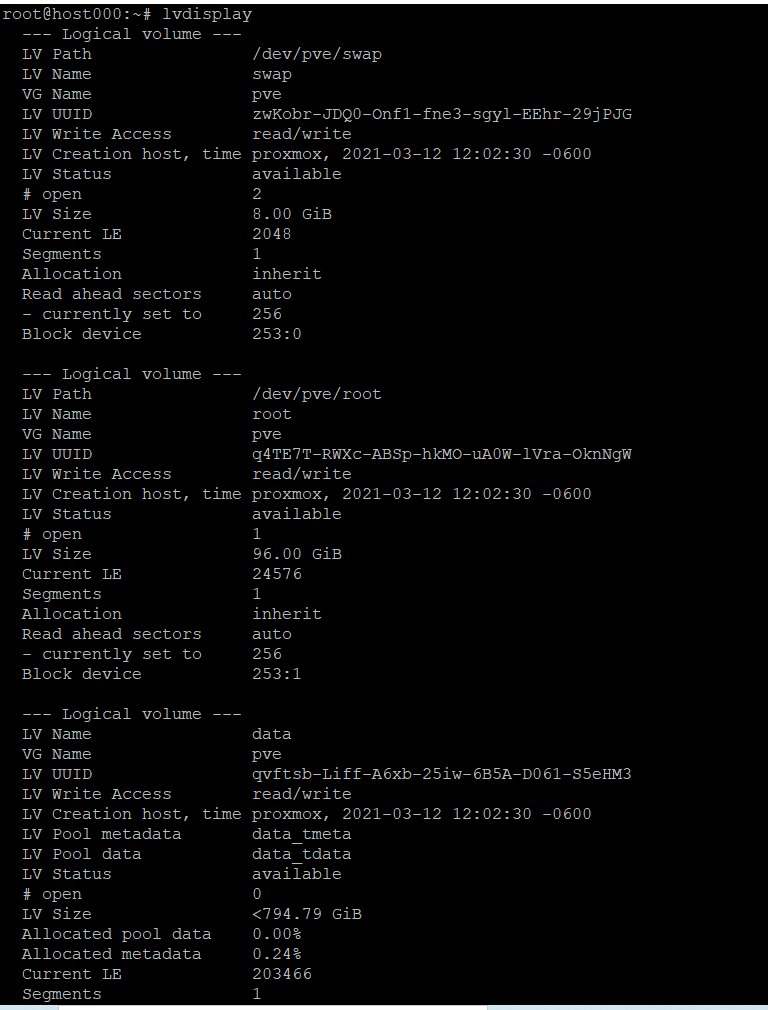
This is with proxmox installed to the single 1 Tb disk. No USB's involved. -
@monte Right. But then I get this:
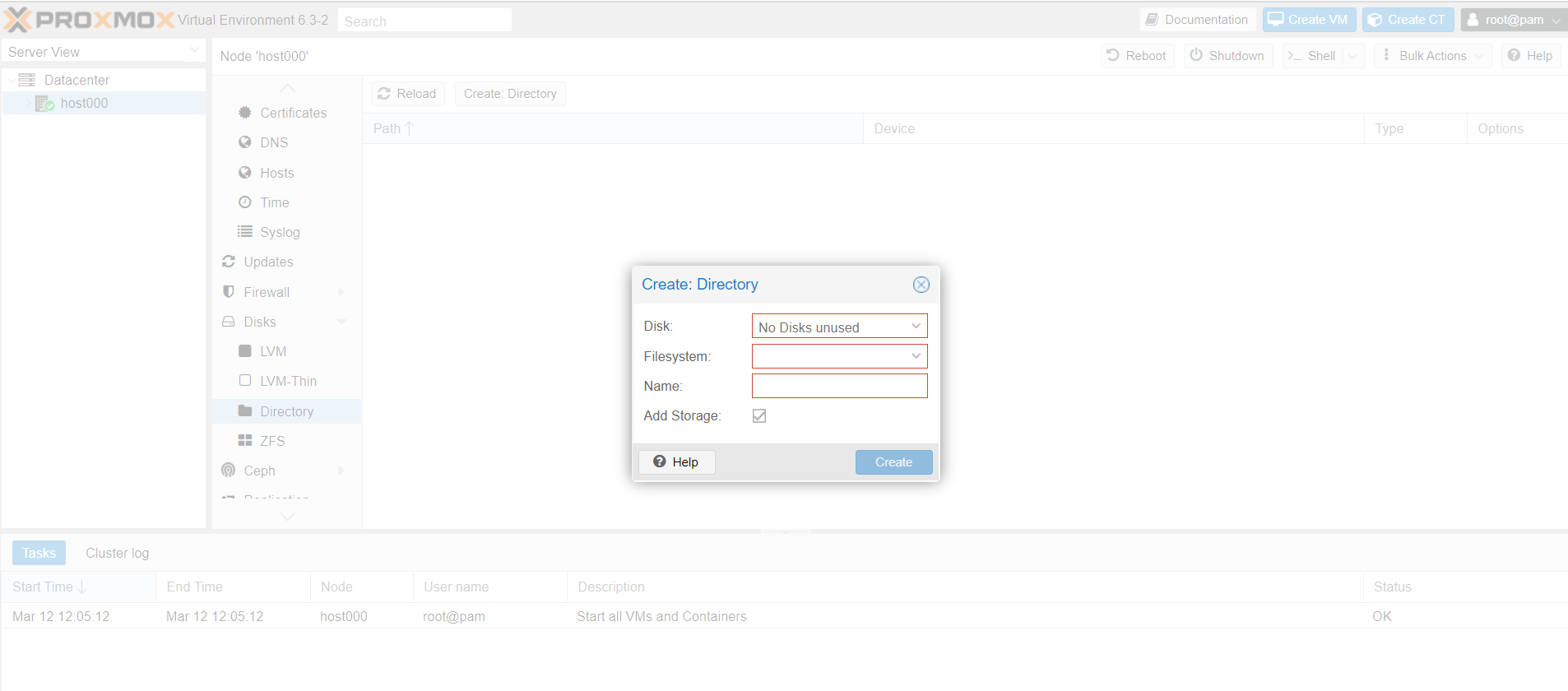
which is where I get stuck. If I add more physical disks, then this doesn't happen. -
@NeverDie expand
host000item in the list on the left. Choose storagelocalat the end of the list, chooseISO Images, hitUpload.
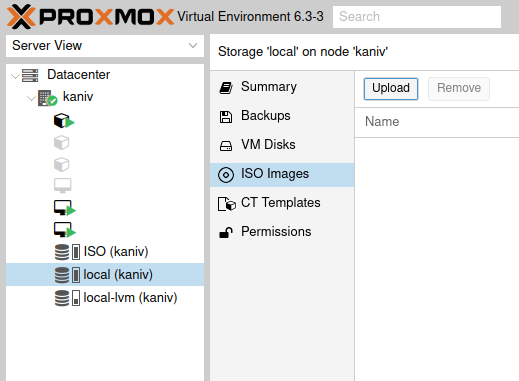
Then press create VM on the top right of the GUI.

